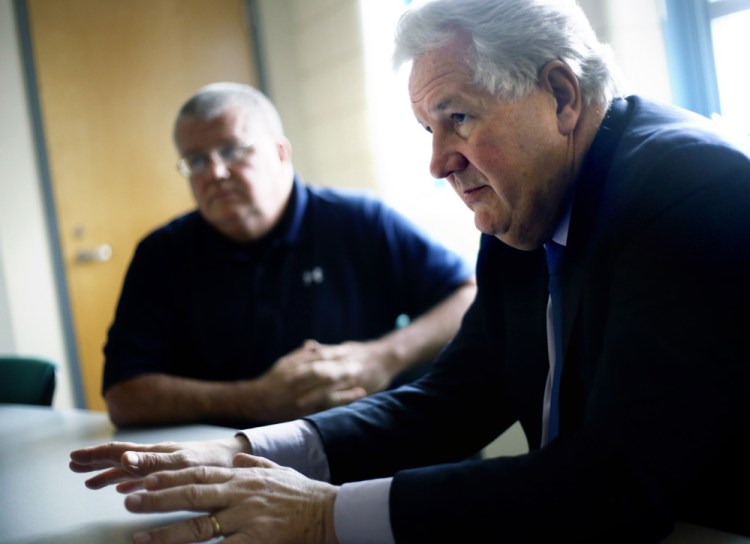We’d like to say something about the news that Operation Hope is pulling back on its out-of-state drug treatment placements, but the problem it exposes is hardly news. Just look at what’s been said already:
“Operation Hope is not the answer. Maine needs a comprehensive answer, and this is not it.” Scarborough police Chief Robert Moulton, on his department’s 2-year-old program helping people with addiction find help, July 19.
“We always wanted to help people closer to home, but we really had no other choice. It was the only way to get people help.” Steve Cotreau, Portland Community Recovery Center, on his work with Operation Hope placing people in out-of-state treatment centers, July 19.
“As Maine’s opioid crisis worsens, 128th Legislature largely does nothing.” Headline, July 9.
“In proportion to the severity of the problem, it’s lacking by a magnitude of an order of at least 10 times what’s needed.” Dr. Mark Publicker, leading addiction expert, on a plan to provide $2 million for addiction treatment for Maine’s uninsured, Feb. 24.
“It will only help the tip of the iceberg, but any help is welcome and should be encouraged.” Dr. Mary Dowd, who treats opioid addiction at the Milestone Foundation in Portland and through Catholic Charities, Feb. 24.
“Maine overdose deaths soared nearly 40 percent last year, to record 378.” Headline, Feb. 2.
“It’s gotten to be very difficult to find beds for people. We were hoping for a regional or state solution, a comprehensive program to come along by now. It hasn’t.” Moulton, Dec. 10, 2016.
“Amid state’s drug crisis, DHHS slow to expand treatment options.” Headline, May 25, 2016.
“Drug overdose deaths surge by ‘shocking’ 31 percent in Maine.” Headline, March 7, 2016.
“I don’t think anyone understands how hard it is to find beds for people.” Cotreau, Feb. 28, 2016.
“There’s just nowhere in Maine to get help.” Scarborough police Officer John Gill, coordinator, Operation Hope, Feb. 28, 2016.
“My office phone rings daily with people looking for help. Most we have to turn away. The other practices that do this work are likewise full. There are very few treatment centers in Maine, and those are generally full with long waiting lists.” Gust Stringos, D.O., Somerset Primary Care, Nov. 28, 2015.
“We know our services are needed, but in the absence of governmental support for treatment, our hands are tied in this decision, and that’s tragic.” Kristin Nolan, Spectrum’s vice president of outpatient service, announcing the organization’s closure following cuts in MaineCare reimbursement rates, Aug. 24, 2015.
“Heroin deaths in Maine jump — record level of overdose deaths in 2014.” News release, Office of the Maine Attorney General, May 15, 2015.
“We have a public health emergency here. It’s going to get far worse. This is just a preview.” Ronni Katz, substance abuse program coordinator for Portland, describing the spike in heroin use, Sept. 26, 2012.
“(The director of Maine’s Office of Substance Abuse) said that despite increasing numbers of addictions reported, Maine’s resources for treatment of drug addictions are dwindling. During rounds of recent state budget cuts, treatment expenditures decreased by $1.4 million between 2009 and 2011.” July 9, 2012.
“You continue with the way you’re doing things and we’re going to be sitting here in the next five years saying the same things.” Capt. Marsha Alexander, administrator of the Kennebec County jail, on the failure to treat prisoners for addiction, April 6, 2012.
“There are tens of thousands of Mainers who have serious opiate addictions and who have no access to care.” Publicker, Oct. 20, 2011.
“During the same period that this epidemic has been growing, treatment resources in Maine have been dwindling because of funding cutbacks. In Maine, this drug problem is fueled by poverty, isolation and despair, and it will not go away on its own.” Peter Wohl, director of outpatient services, Crisis & Counseling Services, Oct. 13, 2011.
Send questions/comments to the editors.




Comments are no longer available on this story